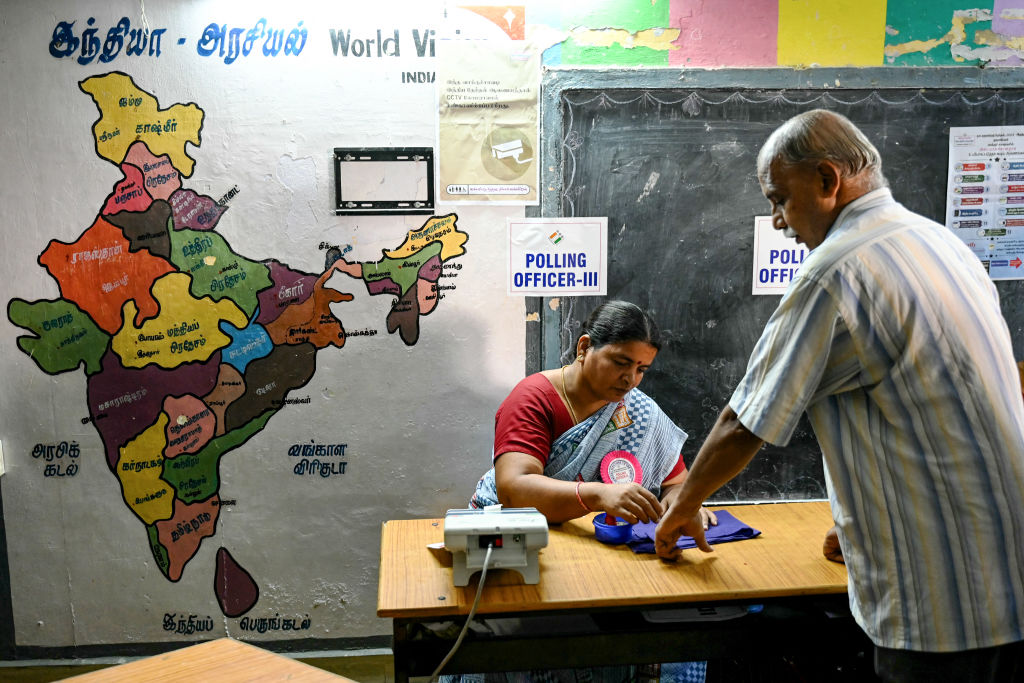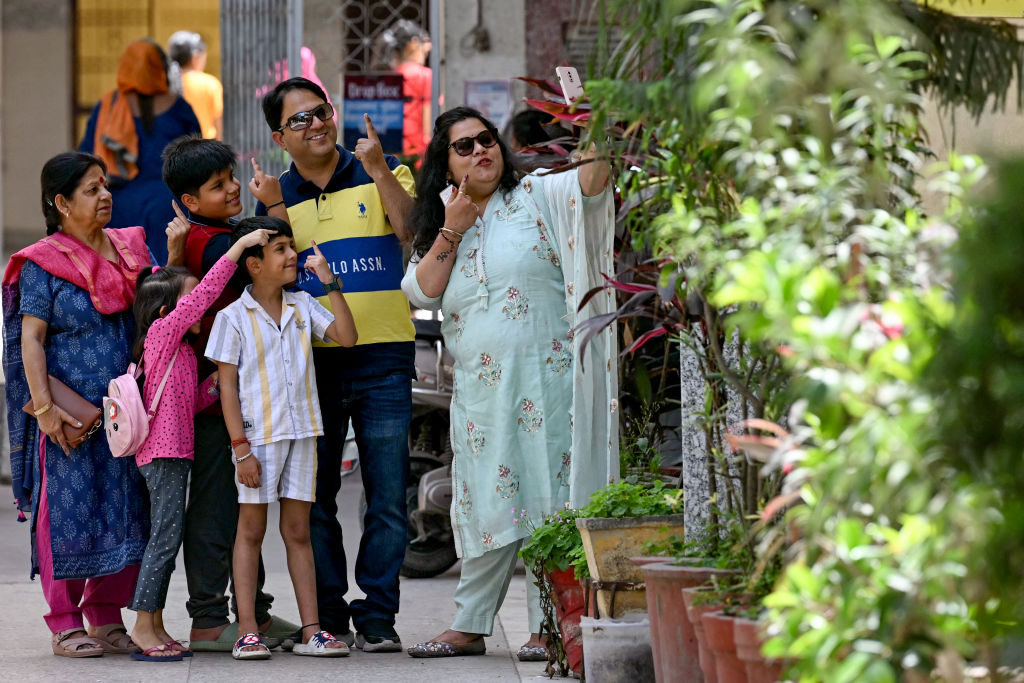- Thursday, May 02, 2024
The highest turnout was recorded in the north-eastern state of Tripura at nearly 80 per cent, said reports.

By: Shubham Ghosh
POLLING for the first phase of India’s marathon national elections on Friday (19) concluded with nearly 64 per cent voter turnout. The figure was nearly 70 per cent in the first phase of the previous elections held in 2019.
The Election Commission of India said an aggregate 63.89 per cent voter turnout was recorded in the first round of the elections and added that the figures could rise more since people were standing queues outside polling booths when voting concluded at 6 pm. They were allowed to exercise their franchise.
Prime minister Narendra Modi expressed satisfaction over the turnout figures saying they suggested that people were voting in favour of his National Democratic Alliance in large numbers.
The election being held in extreme hot conditions will see seven phases.
High turnout in Phase 1 of Lok Sabha Elections 2024 despite heat wave
Polling remains largely peaceful across 21 States/UTs
Polling completed for 10 States/UTs including most of North east
56 villages in Bastar, Shompen tribe of Great Nicobar voted first time
Large number of… pic.twitter.com/1Dc0GFI6us
— PIB India (@PIB_India) April 20, 2024
On Friday, voting was held in 102 constituencies in 21 states and Union Territories across the country in which fates of 1,625 candidates were decided by more than 166 million voters. Voting started at 7 am local time.
Of the Indian states, north-east’s Tripura saw the highest turnout of 80.17 per cent, a release from India’s Press Information Bureau (PIB) said.
First phase, great response! Thank you to all those who have voted today.
Getting EXCELLENT feedback from today’s voting. It’s clear that people across India are voting for NDA in record numbers.
— Narendra Modi (@narendramodi) April 19, 2024
In Bengal, which also saw a voter turnout of above 77 per cent, three constituencies in the northern part of the state were held on the first day and all of them were won by Modi’s Bharatiya Janata Party (BJP) in 2019.
Read: Sporadic violence, gunfire in Bengal, Manipur as world’s largest democracy votes
The lowest turnout was recorded in Bengal’s neighbouring state of Bihar where it was 47.49 per cent, the PIB release added.

All 39 parliamentary seats in the southern state of Tamil Nadu went to polls on the first day and there, 62.19 per cent voter turnout was seen. The BJP could win no seat in the state in the 2019 election and made desperate campaigning this time to reverse the trend.
Read: Google Doodle celebrates India polls; Modi tweets in 6 languages urging people to vote
Violence was reported in some constituencies of Bengal and Manipur, the northeastern state which has witnessed deadly ethnic clashes since May last year, leading to deaths, injuries and displacement of many people. Over 68 per cent of voter turnout was reported about Manipur, where the general mood was opposed to election this year. There were also reports of miscreants damaging at least four electronic voting machines (EVMs) in a polling booth in the state.
In Bengal, supporters of the opponents Trinamool Congress and BJP clashed with each other and lodged 80 and 39 complaints, respectively, related to poll violence, voter intimidation, and assault on poll agents, sources from both parties said.
In Chhattisgarh, 63.41 per cent voters cast their votes in the Maoist-hit Bastar Lok Sabha constituency where a Central Reserve Police Force personnel died after a grenade accidentally went off. An officer was also injured in an IED (improvised explosive device) blast in another incident. It was only three days before the elections that 29 Maoists were killed in an encounter with state security forces in Bastar in one of the largest operations against the Left-wing extremists.
Minor glitches in EVMs were also reported at some booths in the southern states of Tamil Nadu and Arunachal Pradesh and the north-eastern state of Assam, and the Union Territory of Andaman & Nicobar Islands.
For the first time in Andaman and Nicobar Islands, seven members of the Shompen tribe, a particularly vulnerable tribal group of Great Nicobar Islands, voted for the only parliamentary seat.
In a few polling stations in Arunachal Pradesh, polling was delayed as the EVMs developed technical snags which were later replaced, chief electoral officer Pawan Kumar Sain said. The turnout was also moderate in the morning hours due to inclement weather, but it gathered momentum with weather conditions improving.
Among the voters who cast their ballots in the first phase were first-timers, many newly-wed couples who came in their traditional attires, physically-challenged people and some elderly persons carried on stretchers and wheelchairs.
In Uttar Pradesh, India’s most populous and politically most crucial state, five constituencies went to elections in the first phase and the turnout was reportedly around 57.61 per cent, the PIB release said.
A number of prominent ministers in the Modi government besides opposition leaders went to polling on the first day of the election. Among them were road transport minister Nitin Gadkari, earth sciences minister Kiren Rijiju, minister of state for home Nisith Pramanik and environment minister Bhupendra Yadav, among others. Among the opposition leaders contesting on the day were former Indian finance minister P Chidambaram of the Indian National Congress and his son Karti Chidambaram from Tamil Nadu.
Yoga guru Baba Ramdev and Patanjali Ayurved’s managing director Acharya Balkrishna also cast their votes in Haridwar in the northern state of Uttarakhand.
Besides the general elections, state elections in Sikkim and Arunachal Pradesh in north-eastern India were also held the same day.
Earlier in the day, Modi took to X to urge citizens to vote in “record numbers”.
“I particularly call upon the young and first time voters to vote in large numbers. After all, every vote counts and every voice matters,” he tweeted.
Home minister Amit Shah also urged citizens to vote in “large numbers”.
Of the 102 seats that went to polling on Friday, the National Democratic Alliance led by Modi’s BJP could win 41 in the 2019 elections while 45 went to the now-defunct opposition bloc United Progressive Alliance led by the Indian National Congress.
This time, however, six of these constituencies have been redrawn as part of delimitation.
![]()